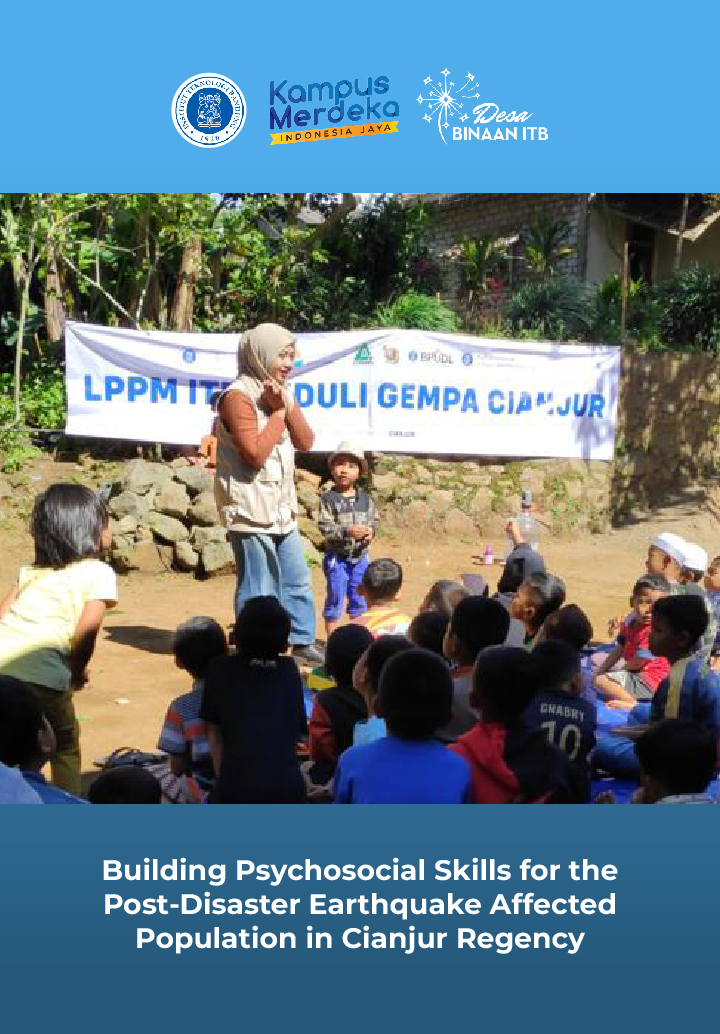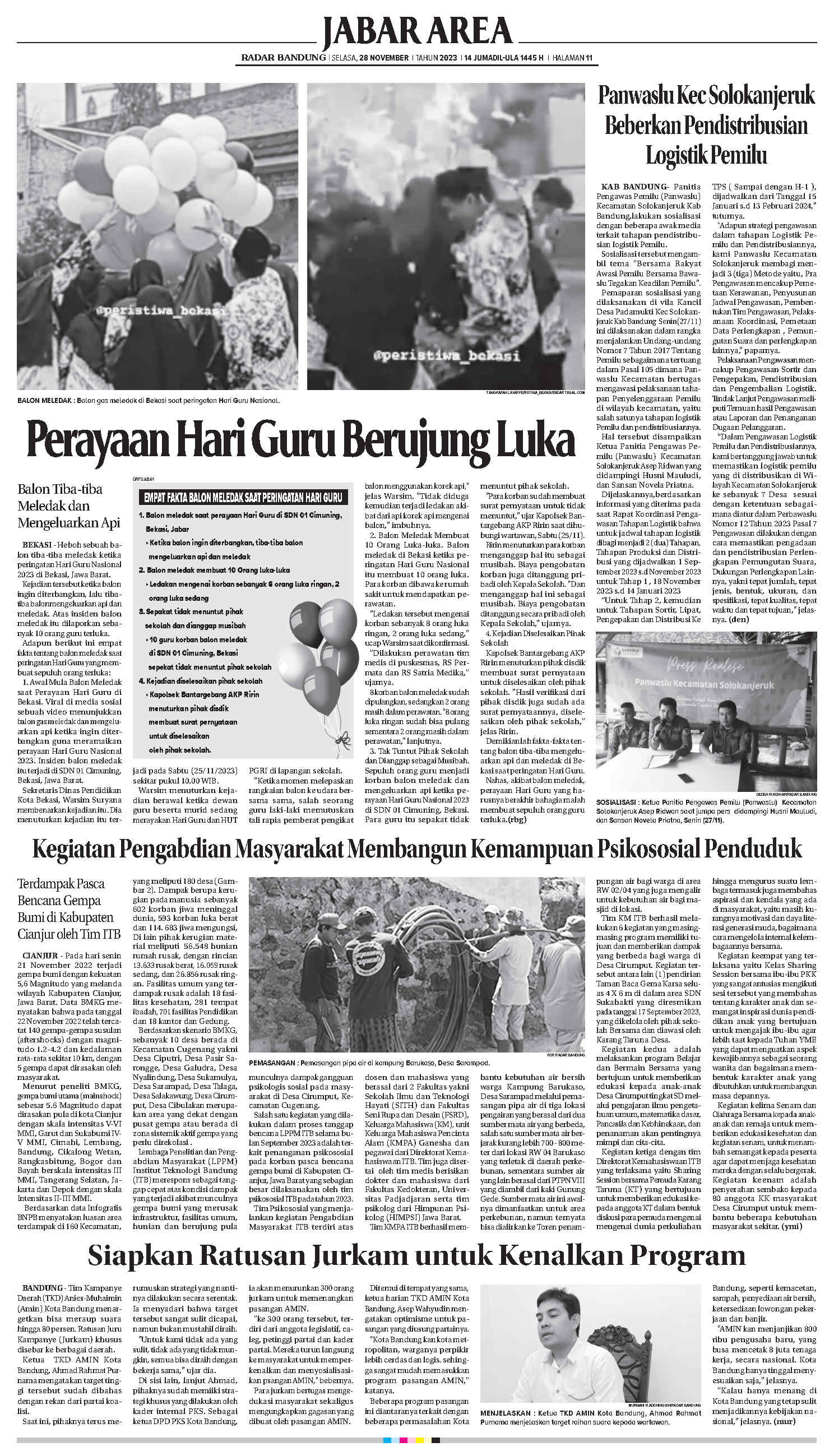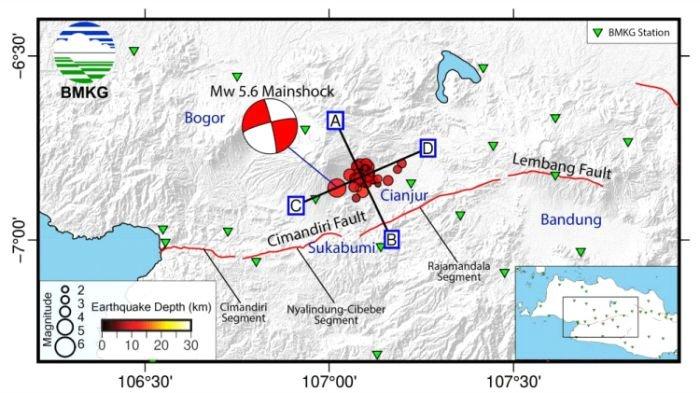

On Monday, November 21, 2022, an earthquake with a magnitude of 5.6 struck the Cianjur Regency, West Java. BMKG data states that on November 22, 2022, there were recorded 140 aftershocks with magnitudes ranging from 1.2 to 4.2 and an average depth of about 10 km, with 5 earthquakes being felt by the community (Figure 1).
According to BMKG researchers, the main earthquake (mainshock) of 5.6 Magnitude was also felt in the city of Cianjur with intensity scales V-VI MMI, Garut and Sukabumi IV-V MMI, Cimahi, Lembang, Bandung, Cikalong Wetan, Rangkasbitung, Bogor, and Bayah with intensity scales III MMI, South Tangerang, Jakarta, and Depok with Intensity scales II-III MMI.
Based on BNPB's Infographic data, the affected area covers 160 districts, including 180 villages (Figure 2). The impacts include human losses of 602 fatalities, 593 severe injuries, and 114,683 displaced individuals. On the other hand, material losses include 56,548 damaged residential buildings, comprising 13,633 severely damaged, 16,059 moderately damaged, and 26,856 lightly damaged. Public facilities affected include 18 health facilities, 281 places of worship, 701 educational facilities, and 18 offices and buildings.
According to BMKG's scenario, a total of 10 villages in Cugenang Sub-District, namely Ciputri Village, Pasir Sarongge Village, Galudra Village, Nyalindung Village, Sukamulya Village, Sarampad Village, Talaga Village, Salakawung Village, Cirumput Village, and Cibulakan Village are areas close to the earthquake epicenter or located in an active seismic zone that needs relocation.
The Institute of Research and Community Service (LPPM) of the Bandung Institute of Technology (ITB) responded promptly to the impact conditions resulting from the earthquake that damaged infrastructure, public facilities, residences, and ultimately led to the emergence of social psychological disturbances in the community of Cirumput Village, Cugenang Sub-District.
One of the activities carried out in ITB's disaster response process during September 2023 was related to psychosocial support for earthquake victims in Cianjur Regency, West Java, mainly implemented by the ITB psychosocial team in 2023.
The ITB Psychosocial Service Team consists of faculty members and students from 2 faculties, namely the School of Life Sciences and Technology (SITH) and the Faculty of Art and Design (FSRD), Family of Students (KM), Ganesha Mountaineering Family (KMPA), and staff from the ITB Directorate of Student Affairs.
The team is also accompanied by a medical team consisting of doctors and students from the Faculty of Medicine, Universitas Padjadjaran, and a psychologist team from the Psychological Association (HIMPSI) of West Java.
The ITB KMPA team successfully assisted in providing clean water needs for the residents of Barukaso Village, Sarampad Village by installing water pipes in three irrigation locations originating from two different water sources, one of which is approximately 700-800 meters away from the location of RW 04 Barukaso in the plantation area, while the other water source comes from PTPN VIII taken from the foot of Mount Gede.
This spring was originally used for plantation areas but turned out to be channeled to the water tower for residents in the RW 02/04 area, which also flows to provide water for the mosque at the location.
The ITB KM team successfully carried out 6 activities, each with different goals and impacts for the residents of Cirumput Village. These activities include (1) establishing the Gema Karsa Reading Garden covering an area of 4 x 6 m within the Sukabakti Elementary School area, which was inaugurated on September 17, 2023, managed by the school authorities together with supervision from the village's Youth Organization.
The second activity is the implementation of the Learn and Play Together program aimed at providing education to elementary school children in Cirumput Village through teaching general knowledge, basic mathematics, Pancasila and Diversity, and instilling the importance of dreams and aspirations. Teaching is done using complete and interesting tools and materials suitable for their age.
The third activity, conducted by the ITB Directorate of Student Affairs team, is a Sharing Session with the Youth Community Organization (KT) aimed at providing education to KT members in the form of discussions among youth about the world of college life to managing an institution, including discussing aspirations and challenges in the community, such as the lack of motivation and literacy skills among the younger generation, and how to collectively manage their internal organization.
The village's condition, with a small percentage of educated young people (in college), leads to various problems related to technology and education.
Furthermore, the fourth activity conducted is a Sharing Session Class with PKK mothers who enthusiastically participated in the session discussing children's characters and the inspirational spirit of children's education aimed at encouraging mothers to be more obedient to the Almighty, which can strengthen their obligations as women and how to shape the character of children needed to build their future.
The fifth activity is Exercise and Sports Together for children and teenagers to provide health education and exercise activities to increase their enthusiasm for maintaining their health by staying active. The sixth activity is the distribution of basic food needs to 80 members of the Cirumput Village community to assist with various community needs.
Other significant activities carried out by the faculty team, SITH and FSRD students, FK UNPAD, and HIMPSI West Java include monitoring the physical and psychological conditions of children and adults who are indicated to have mental disturbances post-disaster, supporting trauma recovery in children and adults, and providing counseling with psychologists for disaster-affected individuals.
The ITB SITH team distributed storybooks donated by the G83 ITB Foundation and retold stories from those books, including providing geometric block games accompanied by children's wave measurements to assess children's cognitive abilities.
The ITB FSRD team conducted art therapy activities for elementary school children and created dioramas for children at Sukabakti Elementary School about their future village aimed at fostering a sense of community together.
The medical team and students from FK UNPAD conducted physical examinations of children to explore their medical needs and psychiatric examinations for adults. Psychologists from HIMPSI West Java provided counseling and psychological support for those in need.
As the effects of natural disasters usually last long, it is hoped that the continuity of Community Service activities under the coordination of ITB's LPPM can be continued considering many disaster victims in several villages in Cianjur Regency still need assistance for recovery, both physically, psychologically, and socially.

